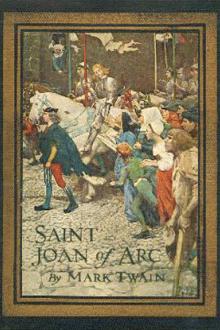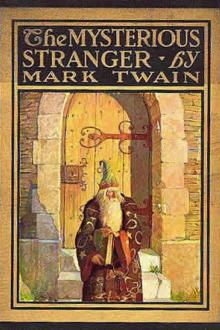Personal Recollections of Joan of Arc, vol 2 by Mark Twain (digital e reader txt) 📕

- Author: Mark Twain
- Performer: -
Book online «Personal Recollections of Joan of Arc, vol 2 by Mark Twain (digital e reader txt) 📕». Author Mark Twain
She denied the accusation of idolatry and that she had sought men’s homage. She said:
“If any kissed my hands and my vestments it was not by my desire, and I did what I could to prevent it.”
She had the pluck to say to that deadly tribunal that she did not know the fairies to be evil beings. She knew it was a perilous thing to say, but it was not in her nature to speak anything but the truth when she spoke at all. Danger had no weight with her in such things. Note was taken of her remark.
She refused, as always before, when asked if she would put off the male attire if she were given permission to commune. And she added this:
“When one receives the sacrament, the manner of his dress is a small thing and of no value in the eyes of Our Lord.”
She was charge with being so stubborn in clinging to her male dress that she would not lay it off even to get the blessed privilege of hearing mass. She spoke out with spirit and said:
“I would rather die than be untrue to my oath to God.”
She was reproached with doing man’s work in the wars and thus deserting the industries proper to her sex. She answered, with some little touch of soldierly disdain:
“As to the matter of women’s work, there’s plenty to do it.”
It was always a comfort to me to see the soldier spirit crop up in her. While that remained in her she would be Joan of Arc, and able to look trouble and fate in the face.
“It appears that this mission of yours which you claim you had from God, was to make war and pour out human blood.”
Joan replied quite simply, contenting herself with explaining that war was not her first move, but her second:
“To begin with, I demanded that peace should be made. If it was refused, then I would fight.”
The judge mixed the Burgundians and English together in speaking of the enemy which Joan had come to make war upon. But she showed that she made a distinction between them by act and word, the Burgundians being Frenchmen and therefore entitled to less brusque treatment than the English. She said:
As to the Duke of Burgundy, I required of him, both by letters and by his ambassadors, that he make peace with the King. As to the English, the only peace for them was that they leave the country and go home.”
Then she said that even with the English she had shown a pacific disposition, since she had warned them away by proclamation before attacking them.
“If they had listened to me,” said she, “they would have done wisely.” At this point she uttered her prophecy again, saying with emphasis, “Before seven years they will see it themselves.”
Then they presently began to pester her again about her male costume, and tried to persuade her to voluntarily promise to discard it. I was never deep, so I think it no wonder that I was puzzled by their persistency in what seemed a thing of no consequence, and could not make out what their reason could be. But we all know now. We all know now that it was another of their treacherous projects. Yes, if they could but succeed in getting her to formally discard it they could play a game upon her which would quickly destroy her. So they kept at their evil work until at last she broke out and said:
“Peace! Without the permission of God I will not lay it off though you cut off my head!”
At one point she corrected the proc�s verbal, saying:
“It makes me say that everything which I have done was done by the counsel of Our Lord. I did not say that, I said ‘all which I have well done.’”
Doubt was cast upon the authenticity of her mission because of the ignorance and simplicity of the messenger chosen. Joan smiled at that. She could have reminded these people that Our Lord, who is no respecter of persons, had chosen the lowly for his high purposes even oftener than he had chosen bishops and cardinals; but she phrased her rebuke in simpler terms:
“It is the prerogative of Our Lord to choose His instruments where He will.”
She was asked what form of prayer she used in invoking counsel from on high. She said the form was brief and simple; then she lifted her pallid face and repeated it, clasping her chained hands:
“Most dear God, in honor of your holy passion I beseech you, if you love me, that you will reveal to me what I am to answer to these churchmen. As concerns my dress, I know by what command I have put it on, but I know not in what manner I am to lay it off. I pray you tell me what to do.”
She was charged with having dared, against the precepts of God and His saints, to assume empire over men and make herself Commander-in-Chief. That touched the soldier in her. She had a deep reverence for priests, but the soldier in her had but small reverence for a priest’s opinions about war; so, in her answer to this charge she did not condescend to go into any explanations or excuses, but delivered herself with bland indifference and military brevity.
“If I was Commander-in-Chief, it was to thrash the English.”
Death was staring her in the face here all the time, but no matter; she dearly loved to make these English-hearted Frenchmen squirm, and whenever they gave her an opening she was prompt to jab her sting into it. She got great refreshment out of these little episodes. Her days were a desert; these were the oases in it.
Her being in the wars with men was charged against her as an indelicacy. She said:
“I had a woman with me when I could—in towns and lodgings. In the field I always slept in my armor.”
That she and her family had been ennobled by the King was charged against her as evidence that the source of her deeds were sordid self-seeking. She answered that she had not asked this grace of the King; it was his own act.
This third trial was ended at last. And once again there was no definite result.
Possibly a fourth trial might succeed in defeating this apparently unconquerable girl. So the malignant Bishop set himself to work to plan it.
He appointed a commission to reduce the substance of the sixty-six articles to twelve compact lies, as a basis for the new attempt. This was done. It took several days.
Meantime Cauchon went to Joan’s cell one day, with Manchon and two of the judges, Isambard de la Pierre and Martin Ladvenue, to see if he could not manage somehow to beguile Joan into submitting her mission to the examination and decision of the Church Militant—that is to say, to that part of the Church Militant which was represented by himself and his creatures.
Joan once more positively refused. Isambard de la Pierre had a heart in his body, and he so pitied this persecuted poor girl that he ventured to do a very daring thing; for he asked her if she would be willing to have her case go before the Council of Basel, and said it contained as many priests of her party as of the English party.
Joan cried out that she would gladly go before so fairly constructed a tribunal as that; but before Isambard could say another word Cauchon turned savagely upon him and exclaimed:
“Shut up, in the devil’s name!”
Then Manchon ventured to do a brave thing, too, though he did it in great fear for his life. He asked Cauchon if he should enter Joan’s submission to the Council of Basel upon the minutes.
“No! It is not necessary.”
“Ah,” said poor Joan, reproachfully, “you set down everything that is against me, but you will not set down what is for me.”
It was piteous. It would have touched the heart of a brute. But Cauchon was more than that.
Chapter 14 Joan Struggles with Her Twelve Lies
WE WERE now in the first days of April. Joan was ill. She had fallen ill the 29th of March, the day after the close of the third trial, and was growing worse when the scene which I have just described occurred in her cell. It was just like Cauchon to go there and try to get some advantage out of her weakened state.
Let us note some of the particulars in the new indictment—the Twelve Lies.
Part of the first one says Joan asserts that she has found her salvation. She never said anything of the kind. It also says she refuses to submit herself to the Church. Not true. She was willing to submit all her acts to this Rouen tribunal except those done by the command of God in fulfilment of her mission. Those she reserved for the judgment of God. She refused to recognize Cauchon and his serfs as the Church, but was willing to go before the Pope or the Council of Basel.
A clause of another of the Twelve says she admits having threatened with death those who would not obey her. Distinctly false. Another clause says she declares that all she has done has been done by command of God. What she really said was, all that she had done well—a correction made by herself as you have already seen.
Another of the Twelve says she claims that she has never committed any sin. She never made any such claim.
Another makes the wearing of the male dress a sin. If it was, she had high Catholic authority for committing it—that of the Archbishop of Rheims and the tribunal of Poitiers.
The Tenth Article was resentful against her for “pretending” that St. Catherine and St.
Marguerite spoke French and not English, and were French in their politics.
The Twelve were to be submitted first to the learned doctors of theology of the University of Paris for approval. They were copied out and ready by the night of April 4th. Then Manchon did another bold thing: he wrote in the margin that many of the Twelve put statements in Joan’s mouth which were the exact opposite of what she had said. That fact would not be considered important by the University of Paris, and would not influence its decision or stir its humanity, in case it had any—which it hadn’t when acting in a political capacity, as at present—but it was a brave thing for that good Manchon to do, all the same.
The Twelve were sent to Paris next day, April 5th. That afternoon there was a great tumult in Rouen, and excited crowds were flocking through all the chief streets, chattering and seeking for news; for a report had gone abroad that Joan of Arc was sick unti death. In truth, these long s�ances had worn her out, and she was ill indeed. The heads of the English party were in a state of consternation; for if Joan should die uncondemned by the Church and go to the grave unsmirched, the pity and the love of the people would turn her wrongs and sufferings and death into a holy martyrdom, and she would be even a mightier power in France dead than she had been when alive.
The Earl of Warwick and the English Cardinal (Winchester) hurried to the castle and sent messengers flying for physicians. Warwick was a hard man, a rude, coarse man, a man without compassion. There lay the sick girl stretched in her chains in her iron cage—not an object to move man





Comments (0)